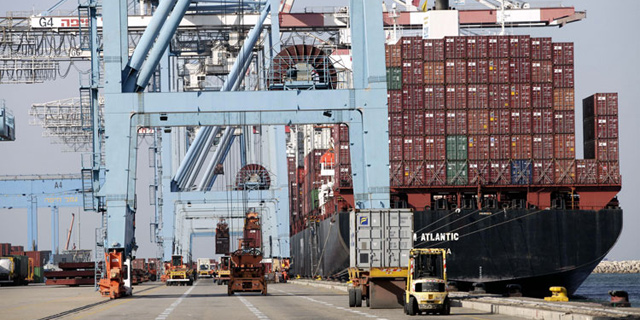
Israel Demands at Least $290 Million for Privatization of Haifa Port
A second, private port is currently being constructed in the northern city, to be operated by China-owned SIPG for 25 years
Lior Gutman | 12:09, 26.12.19
Israel wants at least NIS 1 billion (approximately $287.6 million) for the privatization of its port in northern city Haifa, and is open to the possibility of selling it to another country, according to an official document sent Wednesday to various ministries for comments prior to final government approval. Reviewed by Calcalist, the document reveals that Israel is looking to sell 100% of the port to a single strategic buyer, combined with a fund raising effort for the port.
According to the document, if the winning bidder offers no more than NIS 1 billion, the entire sum will go towards the port, but any additional sums will go to state coffers. NIS 400 million (approximately $115 million) of the requested payment are intended for the port’s development, with state-owned Israel Ports Development & Assets Co. Ltd. investing a similar sum to upgrade the docks by 2030. Regarding those eligible to apply for the tender, the document says state-linked Israeli corporations will not be permitted to participate, but foreign states or corporations owned by foreign states will be allowed to bid pending proper regulatory and security authorization.
Israel Ports is currently in the process of building two private ports set to start operations within two years, one in Haifa and one in southern town Ashdod, where Israel’s busiest state-owned port is located. The new Haifa port will be operated by China-owned SIPG for 25 years. As, at face value, Chinese-owned companies could participate in the upcoming tender, it could put all of Israel’s northern marine traffic in Chinese hands. The document does state that the government will be able to cut bidders out of the tender or pose additional conditions to protect Israel’s national interests.
Any new owner will have to compete with the second port, meaning there is a possibility that the state will not find a buyer. Yaakov Quint, the head of the Israeli Government Companies Authority, cautioned in an appended letter that the longer the decision takes, the higher the risk for the port’s financial stability. If it will come to that, he said, the authority intends to ask the port to prepare, with government assistance, an aggressive cost-cutting plan that will see many employees laid off and the rest experiencing salary cuts.
The privatization of Haifa’s port was signed in principle with the Israeli ministers of finance and transportation in December 2018. The agreement included a very generous retirement plan for the port’s employees, intended to cut the workforce from 1,000 people to 700, in return for a 10-year grace period. As a significant part of the port’s revenue comes from Israeli maritime cargo transport company ZIM Integrated Shipping Services Ltd.—which might choose to relocate some of its business to the new Chinese-operated port—the port has estimated in the past that the future rivalry could see its revenues fall and its employee count cut by as much as half. For the fiscal year 2018, Haifa port reported an 85% increase in net profit to NIS 177 million (approximately $50.9 million).
